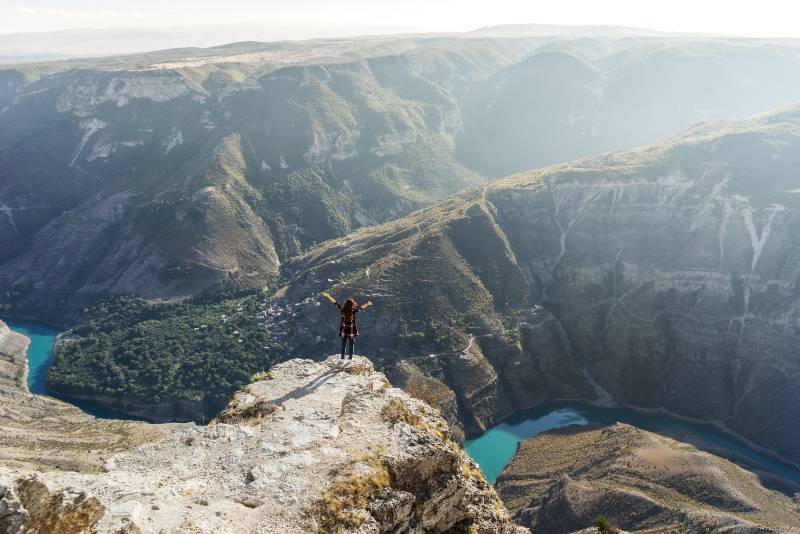Trekking has become a very popular activity among the people. They decide to trek without thinking about the difficulties which they may face on a trek.
Generally, new trekkers are often finding it difficult to complete the trails. Some even return with injuries and bad memories. This happens because of a lack of fitness and physical capacity.
RELATED: 22 Amazing Hiking Trails You Have To See To Believe
Useful Tips for Novice Trekkers
With all the experience that I have gathered while trekking here is a few useful tips for trekkers.
The first rule to follow is to trek at your own pace. This will give you sufficient time to adjust to the changing weather conditions while climbing the mountains and also maintain good stamina till the end.
Going at your own pace will keep you away from unnecessary exertion, overall slowdown, sickness, and of course accidents. So don’t hurry.
Always keep on drinking water or energy drink in a steady manner throughout the trek. It is important to drink water or energy drink consistently and regularly when you are trekking in the mountains to avoid dehydration.
Take few sips of water or energy drink after every fifteen to twenty minutes even if you don’t feel thirsty. Drinking lots of water at a time can also be harmful as it may create pain in the stomach and also make you uneasy.
Eating fruits or light snacks on the way would also keep you energetic and fresh. Whatever may be the season, monsoon, summer, or winter, proper intake of water and food on the way can help you complete your trek successfully.
The third but very important aspect is to keep your body warm. Don’t rest too much on your way. You will not be able to maintain your pace and stamina if you rest too much.
To complete a trek with ease you have to keep on walking steadily and slowly. Resting for 5 to 10 minutes and then walking again on your terrain is perfectly OK. But you cannot stop every now and then.
This is important because when you are on a high altitude trek the weather conditions change rapidly which may bog you down. If you rest too much your body will cool down.
Your body will have to take extra efforts to warm up again and again which will drain you out. The next rule is mostly for those who want to complete the trek by pushing themselves too hard.
When you are in the mountains you have to also enjoy the scenic beauty around you. Mountains are beautiful and so is the surrounding. So when your body starts dehydration and you feel too exhausted don’t continue with the trek.
This shows that you are not fit to move ahead. You can rest for that day and then start again the next day. You cannot risk your health just to prove that you can complete the trek in the given time period. You can face acute mountain sickness if you trek beyond your physical capacity.
When you trek you obviously carry your own stuff in your rucksack. Everyone has to carry their own baggage while climbing the mountains. But if you are not fit for carrying weight you have to practice it before the trek starts.
Two-three months of practice is required to be physically fit to carry the baggage on your own. In the case of high-altitude treks, this practice is a must.
The next important thing is packing the bags to the destination. Whenever you are on a trek, you have to carry all the essential things with you.
Things like food, snacks, water bottles, energy drinks if required, medicines, pair of extra clothes (depending upon the number of days), shoes, socks, cap, sunglasses, sandals, torch, sleeping mat or bag, walking sticks, camera, binoculars and much more as instructed by your mentor.
Once you have decided on a trek, start practicing for it. Practicing means you have to start walking daily for at least 3 to 4 kilometers. You can also go to the gym to strengthen your body muscles particularly your legs.
If not then yoga is also a good option for flexibility and strength. Walking is a very important part of practicing. Along with that, you can either opt for gym or yoga depending on your choice.
Practice walking in the clothes, shoes, and socks which you are going to wear on the day of the trek. Also, try to walk with the rucksack in which you are going to carry all the trekking staff. This would help you on the actual day of trek to carry the load without any difficulty.
Practicing and keeping yourself fit will help you enjoy the trek along with the magnificence of nature on the way. If you go on the trek without practicing then you will get tired and exhausted as your energy level would go down.
Walking, exercising, and meditating can help you to increase your physical as well as mental strength. Fitness is very important when it comes to any kind of adventure.
A trekker should always try to be fit and strong because he or she has to face challenges on his way. These challenges may be unexpected.
Article Source: https://EzineArticles.com/expert/Supriya_Abhay_Deshpande/1936029
Up Next:
- 7 Steps To Setting Up Your Camping Tent
- Survival Foods: Eating Bugs, Insects, and Related Recipes
- 10 Common Household Items With Survival Uses
Calling all preppers, craftsmen, bushmasters, outdoorsmen, and all-around skilled people, Survival Life needs YOU! Click here if you want to write for us.
Don’t forget to stay connected with us on Facebook, Twitter, Pinterest, and Instagram!
Article Source: http://EzineArticles.com/

